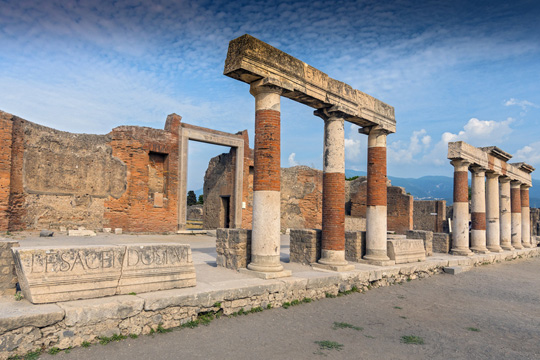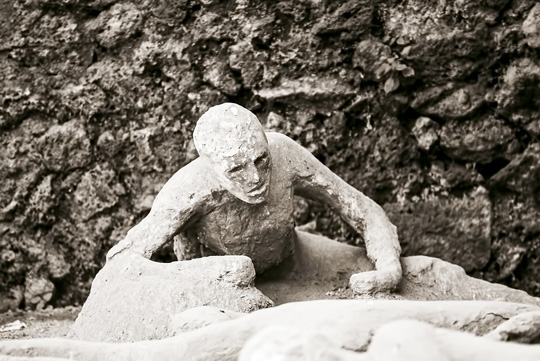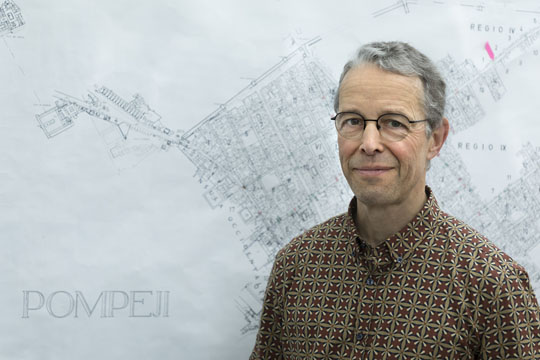An exact date of burial?
Freiburg, Dec 06, 2018
The media called it a sensation when they recently reported that the history books would have to be rewritten - because the ancient city of Pompei was destroyed later than believed. But for Dr. Jens-Arne Dickmann, it wasn’t such a sensation after all. He and other researchers have expressed their doubts about the previously widely-accepted date before, he says. Dickmann, curator of the University of Freiburg’s Archaeological Collection, has been going to Pompei since the late 1980s. Thomas Goebel spoke with him about historical dating and the everlasting fascination of Pompei.
 Excavations have revealed the remains of Pompei’s forum. Photo: Cezary Wojtkowski/Fotolia
Excavations have revealed the remains of Pompei’s forum. Photo: Cezary Wojtkowski/Fotolia
Dr Dickmann, previously we thought that 24 August 79 BCE was the day on which the ancient city of Pompei was buried by Vesuvius. Some time ago the media reported that it was 24 October – why?
Jens-Arne Dickmann: There is a new find which supports the approach that Vesuvius erupted at a later date. But the idea that the eruption was two or even three months later is much older - it is certainly not as new as all that. I myself have published a book about Pompei, and in the third edition, which came out in 2017, a later date is postulated.
What sort of new find?
For the last two years, previously unexcavated parts of the city have been systematically uncovered. In late summer 2018, they found a small charcoal graffito on a wall - a bit of scribble, which may contain a date in October. Since charcoal wears off easily, we suspect that the writing could not have been years old, that it must have been from the year of the destruction.
When your book was published last year, you didn’t know about this graffito. Why did you argue then that Pompei was not destroyed until the autumn of the year 79?

Frozen in time: Researchers give form to the victims of the eruption by making plaster casts of the spaces they left in the hardened volcanic ash.
Photo: BlackMac/Fotolia
Because many archaeological and historical sources raise doubts about the 24th of August. It’s not generally described how we even get to this date. Historians point to a letter by Pliny the Younger which describes the destruction - but we don’t have the original letter, only various medieval copies, none of which is the same as another. And the manuscript considered the most reliable, has a lacuna - a gap - right where the date of Pompei’s destruction is mentioned. The month is not clear, even August is therefore just an assumption.
Why was that date always mentioned?
It’s a lack of clarity in the transmission of academic findings to the public. People were happy to pass it on like that, after all, Pompei is very popular...
...and people want to know the exact date.
Yes, especially in the media version - you think you can look right into history, to the very day it happened.
What do you think supports the view that the destruction wasn’t until autumn 79?
Several observers even during 19th-century excavations were surprised that braziers for charcoal had already been placed in the atriums of many houses, being used apparently because it was cold. More recent excavations have uncovered fruits which are harvested in late summer or early autumn, such as grapes. They include imported goods such as dates - and it is unlikely that there would have been fresh dates from Syria in Pompei at the end of August; dates would have had to be harvested and shipped. Two Roman coins referring to a magistrature for Emperor Titus were found in Pompei; and on the basis of other sources we believe he only received it in mid-September 79.
It sounds like detective work.
Absolutely. We don’t have documentation which directly answers our question. We have to combine what we’ve got.
Would a later date change our view of Pompei?
As I see it, not really. It’s only two or three months - for our understanding of, say, its society or city planning, that doesn’t make a big difference. But I can imagine that the date could have an effect on certain detailed investigations. For instance, we always examine certain organic remains, using them to try to find out about dietary habits and seasonal influences. The date could play a role there.
 Jens-Arne Dickmann has been working in Pompei since the 1980s and plans to travel to the ancient city in spring of 2019 for a new project.
Jens-Arne Dickmann has been working in Pompei since the 1980s and plans to travel to the ancient city in spring of 2019 for a new project.
Photo: Jürgen Gocke
You have just been to Pompei and are going back in spring 2019 - what still interests you about the place?
I am currently a Fellow at the Freiburg Institute for Advanced Studies (FRIAS) and am now able to conduct research again. That is very lucky for me. I want to write a short book about the city’s traffic. It’s a topic which has not really been investigated up to now.
Was traffic a problem in cities even 2000 years ago?
For sure. We can point to a whole lot of places in Pompei in which people influenced the flow of traffic - for instance, by making streets much narrower or installing bollards; this may have been done by private citizens who were bothered by the traffic.

